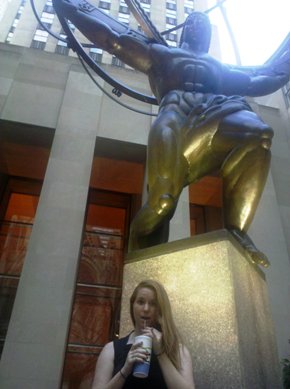Diary entry, February 4, 2010
9:30 a.m.
Today's date will be written on a tombstone bearing my grandfather's name. When I awoke to my sister calling to say that he was dying, I was calm. After all, my grandfather had been dying for awhile now. He slowly lost everything that made life enjoyable--a while ago, his hearing, then his sight became so bad that he could no longer read the encyclopedia or the National Geographic, and finally his mobility deteriorated, so he could no longer walk to sit out in the sunlight of the backyard as he did often at his house, and later when he came to ours. But the more I talked about it, especially talking about how my mother would tear up at the mere mention of her father's mortality, the more emotional I became. I called my mom and she didn't answer. Rushing to class, burdened by a load of art supplies and breakfast to-go, I didn't hear her calling back. I don't know the emotional state of my mother or the physical state of my grandfather when she gave me that call, and imagining that perhaps I was the first call after my mom realized my grandfather died, gives me great guilt. I called my mom back, and she cried out, "He's gone, he's gone."
When someone dies, the most tragic and infuriating thing is that the world doesn't stop. I am angry at everyone smiling or talking or laughing. I wanted the moment my mom cried out "He's gone, he's gone" for everyone to dress in black, pull out magnificent headdresses and floats, and march down the street, wailing out traditional phrases and songs. But instead, as always, people in my house made small talk as I grabbed breakfast, men made passes at me as I walked down the street to class, and the guy behind me is laughing loudly to himself in the otherwise silent lounge.
I feel guilty because my mom is all alone at home and she wouldn't be if I were taking classes at home like she wanted. My mom is all alone to suffer this death and her grief will be the most tragic of all. She wheeled him out into the sun for his final hours, and was there as witness during his death. Before he died, as she sat next to him, she was alone in a way because my grandfather was not coherent in his final days, but there must have been a moment when she realized she was truly alone. She must have thought--"is he dead?" and reached out in trepidation to touch his cold neck and feel no heartbeat. And even in her grief, she had to go through the motions of life; she couldn't break down in a corner or march down the street wailing in black because she had to invite strangers in uniform to come into her home, the first people she saw after his death, and have them interrogate her to make sure she wasn't negligent. She! She who had taken him in, made labeled meals for him, reminded and re-reminded him of every pill, consulted everyone for advice to make his last days better, spoon-fed him, clothed him, washed him, and lifted him when he had fallen. Her father had become dependent on her and covered his face as he muttered shamefully, "I'm just like a baby, aren't I?" Her father became her child and she loved him all the more with the love only a parent can have for their child. I told my mother when I spoke with her, "I love you" and she said "I love you more" and I knew it was true. In his last days she grew to love her pridefully independent father more than she thought she ever could--and when we spoke she said, "I hope he knows [present tense] that I love him." I am haunted by the tone of her voice as she said, "saaaad, saaad, this world is saad," over and over, the crack in her voice when she said, "he was a good man, a good father," and the guilt in her voice when she said that she did everything she could, but couldn't stop it. She will be keenly aware of his absence after being with him day after day.
3 p.m.
For my first class, I was lucky enough that my professor ironically had a family emergency, so I was able to talk with my mother and grieve. The class then went without the professor to draw Botero's Abu Ghirab exhibit; I sketched a work composed of 3 panels while listening to Bob Dylan's "Buckets of Rain," keenly feeling the pain of the prisoners, and it was my best work so far. After going to my next lecture in Oakland, I walked to Chinatown where I ate rich Honey Walnut Shrimp and fried bananas, covering my pain with saturated fat. As I walked to the restaurant, it began to sprinkle, by the time I left, it was pouring. God made it sunny this morning for my grandfather's final moments, and now He is grieving his loss. Finally the people around me have the same sadness on their faces and still quiet in their walk as me. They are like children, unsure of why their Father is grieving, but aware that they should be sorrowful and serene. A sea of black umbrellas emerged to match my own, and I finally had the costumed grieving procession going down the street that I wished for. Thick globs of tears fell from the sky, and the wind wailed its displeasure.
